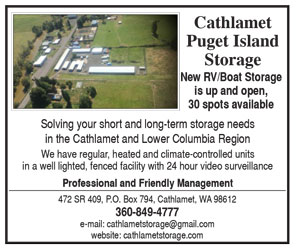Summit talks: Looking for rate relief
October 18, 2012
What can people and local government do to lower the rates for Cathlamet's sewer and water utilities?
That was the subject of a summit meeting hosted Tuesday afternoon by the Wahkiakum Chamber of Commerce.
Chamber members said the town's utility rates are hurting businesses and people on fixed incomes. Schedule increases will just make the problems worse and threaten the survival of some businesses.
Discussion focused on two areas: 1. How to encourage more residences to connect to the sewer and water systems and share in the costs of supporting the systems, and 2. How the rate structures place unequal burdens on some ratepayers and what could be done to change the structures.
The town's sewer rates are scheduled to increase in steps from $55 to $80 in town and from $68 to $93 out of town over the next two years, said Mayor George Wehrfritz, to cover the town's share of the cost of building a new waste water treatment plant.
The plant should be large enough to accommodate the community's sewage for many years, he said. The total cost will be around $9 million; the town has received grants to cover $4 million of the cost and has low interest federal loans to cover the rest.
"More than half the fee pays debt," Wehrfritz said.
Some discussion centered on the line constructed six years ago from the new sewer plant site to Boege Road. It was anticipated that houses in a new development by the golf course would connect to the line, but the Great Recession has kept home builders quiet.
The town this year cut its connection fee from $3,000 to $100 to encourage people to connect to the main, and town and county officials have discussed how to encourage Rosedale Heights residents to connect to the main.
The county financed construction of the Boege Road line, and a $3,000 connection fee remains in effect to cover the county's expense.
Mains could be built by means of a local improvement district (LID), said Loren Jennings, a civil engineer who resides on Puget Island and who has worked with LIDs in other areas. Residents of an area can vote to form an LID, or state officials can force the formation of an LID to address a public health threat.
County Commissioner Lisa Marsyla said she would like to hear from Rosedale Heights residents that they would like to have the sewer system expanded into their neighborhood before pursuing formation of an LID.
Cathlamet real estate broker David Nelson said many of the residences on the hill have two lots, one for their house and one for their drainfield. If they were on a municipal sewer line, the empty lots could become sites for houses. Even in the current depressed economy, the lots are worth around $40,000, he said.
Undersheriff Mark Howie spoke as a Cathlamet land owner and said he had property elsewhere in the Rosedale area that he would connect to a sewer main if it were available.
Wehrfritz said town officials are already mapping areas that could be served by main extensions.
Sue Cameron, the county's new director of Health and Human Services, said there are funding programs to help homeowners connect to new sewer lines, when there is a mandate to do so.
"We can't make a case unless there is a public health problem," she said.
"For this to move forward, I think you need to take the county out of it," Marsyla said. "If you can't get the people above to hook up, you can't fund it."
Business owners complained that the town's sewer and water rates impact some people unfairly.
Sewer rates are charged on an "equivalent customer unit" (ECU) basis which corresponds to a household.
Multiple family residences and duplexes pay for 1 ECU plus .7 for each additional dwelling unit. A hotel, motel or RV park pays 1 ECU plus .4 for each rental unit.
Thus the bill for the Hotel Cathlamet is based on the number of rooms, whether or not they're full, said proprietor Stephanie and Kevin Prestegard, and in the winter, occupancy is very low.
Also, said Mark and Deb Howie, tennants in their building are struggling to cover their expenses and will have a hard time with the increasing rates.
Wehrfritz said rates are needed to cover system expenses, and previous councils' decisions to keep rates low have meant the town has built no reserve to cover construction costs.
One possible solution, he said, is to base sewer rates on water consumption. Thus, when the hotel is in the off season, the rate would be lower because water consumption would be low.
However, Jennings, cautioned, the town would still have to collect enough revenue to cover its expenses. After the meeting, he said he would try to create a rough data base to model how a consumption based rate would work.
Wehrfritz said the town went through a study of its water rates last year and learned that under the current rate, which gives a basic quantity before adding a consumption charge to the basic charge, conservative, low volume users are subsidizing high volume users. He anticipates that the council's utility committee will examine that issue after they finish work on the 2013 budgets.
Wehrfritz encouraged the business owners to present their concerns to the town council.
"Come up with a specific alternate plan that's comprehensive," he said.
The group agreed to have another meeting in a few months, but no date was set.









Reader Comments(0)